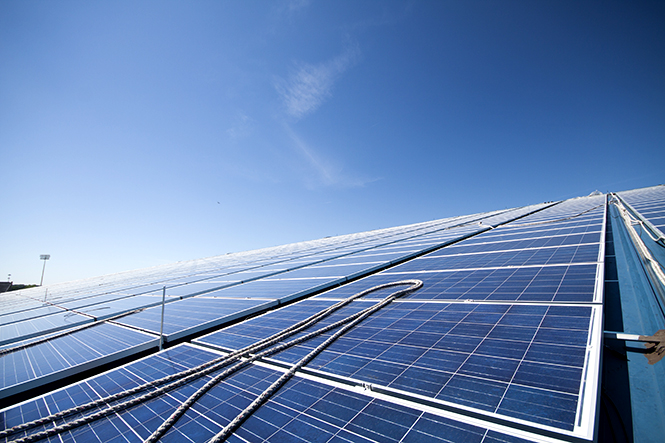Field House solar panels save energy, not money
July 10, 2013
Solar panels installed last year on the roof the Kent State Field House are benefiting the environment, despite costing the university around $20,000 more per year.
Third Sun Solar, an Ohio-based clean energy company, bought and installed solar panels on the Field House’s roof in July 2012. Under a power purchase agreement, the company will assist the university for the next 20 years. These solar panels are projected to generate about 500,000 kilowatt-hours (kWh) of electricity per year, according to Bob Misbrener, project II manager at the Office of University Architect.
“It’s more of a reduction in the pollution that we would have emitted from the Field House because of using utility power,” Misbrener said about the solar panels’ purpose. “It’s not an energy reduction or conservation. It’s an avoidance of using utility power that’s polluting more by just using a clean source of energy.”
The Field House and Dix Stadium were never powered by Kent State’s Power Plant due to its distance from the buildings, so Ohio Edison, a FirstEnergy company, was previously the main power source. When the university began looking for alternative energy options, sustainability manager Melanie Knowles said installing solar panels was the most viable and cost effective option. Misbrener said the solar panels were purposely installed on the south side of the Field House’s roof because it’s the side that sees the most sun during the day.
“Plus, it’s a metal roof,” Misbrener said. “Metal roofs are the easiest to attach it [the solar panel] to. There’s no penetration in this roof because of these solar panels.”
Misbrener said Kent State was paying Ohio Edison 10 cents per kWh generating 1.5 million kWh for both buildings, which totaled to be about $150,000 per year. Now the university is paying Third Sun Solar 18 cents per kWh and expecting to generate 500,000 kWh. Since the remaining 1 million kWh still needs to be covered, the university pays Ohio Edison $100,000 for this amount of energy. For the first year, the university paid Third Sun Solar $90,000, which increases by two percent each year due to utility inflation. Misbrener said the university is estimated to be paying about $40,000 more per year by using both the solar panels and Ohio Edison.
“We have a power purchase agreement,” he said. “But as a fiscally responsible university, we’re always trying to save money.”
Misbrener said the university will receive a $20,000 solar renewable energy credit each year from any Ohio utility that purchases them, which can be sold to the open market to offset the cost. FirstEnergy will give the university credit for the energy that is not used to go to Ohio Edison’s grid system. This way, Kent State is technically only paying about $20,000 more per year. Knowles said the benefit from this is that the university does not have to worry about repairs because the solar panels are not theirs to maintain.
“It’s a wonderful first step,” Knowles said. “It was done in a way that protects the interest of the university and supports local business. Hopefully, it’s just the first big project of many to come with regard to alternative energy on the Kent State campuses.”
There are also three major environmental benefits coming from the solar panels. Because there are zero CO? emissions, this eliminates about 779,000 pounds of CO? per year and lowers the amount of emissions equivalent to burning about 39,000 gallons of gasoline or removing about 74 cars off the road) Misbrener said. It also reduces about $50,000 per year in national health care costs for asthma or other respiratory issues. He said these benefits are what make the solar additions worth it in the long run.
“I’m so excited that I got to be a part of it,” Misbrener said. “I love being able to demonstrate to all the students that this is possible, that we’re doing this not for just Kent State University, but for everybody at Kent State University and in the world.”
Contact Cindy Deng at [email protected].

























